Our ancestral hall
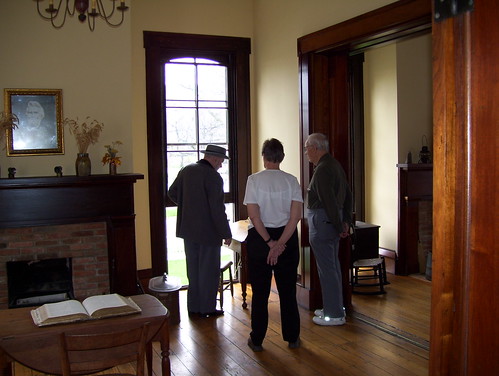
I will be giving tours of the house on April 7th and 14th, from 1:00 to 4:00 p.m. both days. I'd be glad to show it to you sometime.
The history of Springfield, Illinois mixed with family history as well as the life and work of Vachel Lindsay are examined and discussed here.


Labels: docent, elijah iles house, springfield
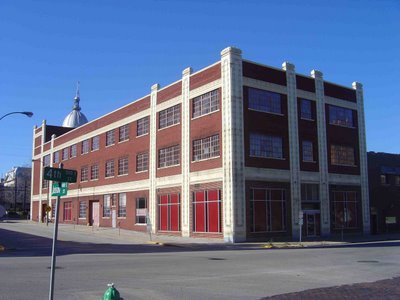
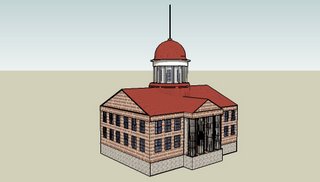
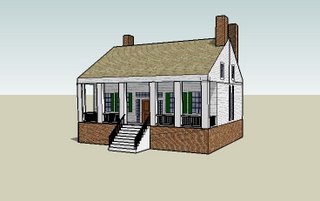
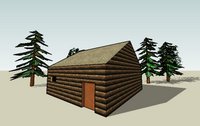 There is still much for me to learn. I’ll have to solve problems like terraforming, creating dirt (mud) streets, fashioning domes, etc., but it all seems “doable” now.
There is still much for me to learn. I’ll have to solve problems like terraforming, creating dirt (mud) streets, fashioning domes, etc., but it all seems “doable” now. I just now this very moment returned home from the christening of the premier exhibit of The Farrell & Ann Gay Museum of Springfield History, "Time to Remember", in the basement of The Elijah Iles House. "Time To Remember" features the wristwatches & other memorabilia of the Illinois Watch Company from Mr. Gay's collection.
I just now this very moment returned home from the christening of the premier exhibit of The Farrell & Ann Gay Museum of Springfield History, "Time to Remember", in the basement of The Elijah Iles House. "Time To Remember" features the wristwatches & other memorabilia of the Illinois Watch Company from Mr. Gay's collection.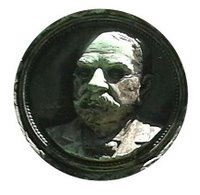 Edward Lewis Baker (not to be confused with Edward Dickenson Baker) played a very important and intimate role in the political life of Abraham Lincoln. As editor and proprietor of The Illinois State Journal, Baker served as Lincoln's mouthpiece during the presidential campaign of 1860 and particularly during the period between Lincoln's election in November, 1860 and his inauguration in March, 1861.
Edward Lewis Baker (not to be confused with Edward Dickenson Baker) played a very important and intimate role in the political life of Abraham Lincoln. As editor and proprietor of The Illinois State Journal, Baker served as Lincoln's mouthpiece during the presidential campaign of 1860 and particularly during the period between Lincoln's election in November, 1860 and his inauguration in March, 1861.In at least one instance newspaper intemperance resulted in physical violence. Early in September [1858] E.L. Baker, the editor of the Journal, charged John A. McClernand with the authorship of a Register article which he had found offensive. Shortly afterward McClernand met Baker on the street, denied that he had written the article in question, and demanded that he publish a correction of his statement. Baker answered that he had nothing to retract, whereupon McClernand belabored him with his cane until bystanders stopped the fracas.
* * *
But though Lincoln himself was inflexible in his refusal to announce a definite policy, there were other indications of his attitude which observers lost no time in utilizing. One such was the editorial column of the Illinois State Journal, whose editor, E.L. Baker, was a cousin by marriage of Mrs. Lincoln and Lincoln's own friend and supporter. Disclaiming any intention of speaking for the President-elect, Baker left no doubt of his own attitude. Neither South Carolina nor any other state could dissove the Union by passing resolutions to that effect. "Disunion, by armed force, is TREASON," he wrote in an editorial so forceful that it was reprinted all over the country, "and treason must and will be put down at all hazards. This Union is not, will not, and cannot be dissolved until this Government is overthrown by traitors who have raised the disunion flag. Can they overthrow it? We think not. 'They may disturb its peace -- they may disrupt the course of its prosperity -- they may cloud its reputation for stability -- but its tranquility will be restored, its prosperity will return, and the stain upon its national character will be transfered and remain an eternal blot on the memory of those who caused the disorder.' Let the secessionists understand it -- let the press proclaim it -- let it fly on the wings of lightening, and fall like a thunderbolt on those now plotting treason in convention, that the Republican party, that the great North, aided by hundreds of thousands of patriotic men in the slave States, have determined to preserve the Union -- peacably if they can, forcibly if they must!"
* * *
"Within a few months of Lincoln's inauguration Dubios was angered by the administration's coolness towards men he had recommended for office. Herndon compained of Lincoln's slowness in attacking slavery -- "Does he suppose he can crush -- squelch out this huge rebellion by pop guns filled with rose water?" Conkling thought the President weak and half-hearted. Baker of the Journal inveighed against the "dilly-dallying of the Government with the Southern traitors."